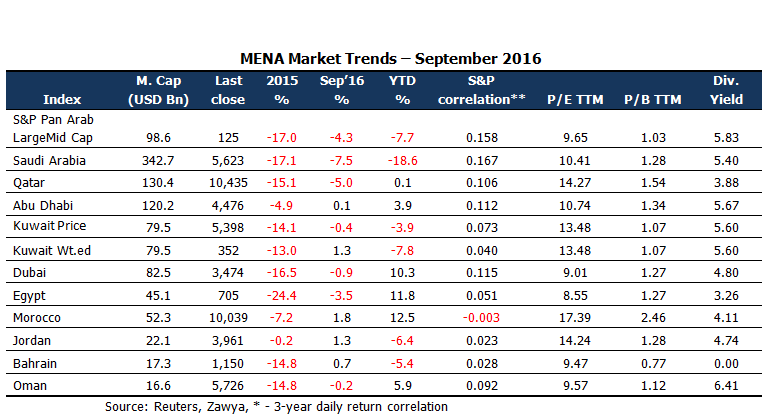
Kuwait Financial Centre “Markaz” recently released its Monthly Market Research report. In this report, Markaz examines and analyzes the performance of equity markets in the MENA region as well as the global equity markets for the month of September.
The report stated that GCC bourses continued to stumble in the month of September, despite the oil price touching USD 50 per barrel. Saudi’s TASI index shed 7.5%, followed by Qatar (5%) and Egypt (3.5%). Saudi Arabia’s stock market went deep into red over fears that the government could introduce more austerity measures to curb a big budget deficit caused by low oil prices. Despite addition of 22 stocks in the FTSE's secondary emerging market index, across the board profit booking in Qatar and declining Producer’s Price Index (PPI), led to the index falling by 5% last month. Speculation over possible further devaluation of the Egyptian pound, due to expected floatation of the currency in the market, led to increased volatility in the Egyptian markets, as the country’s main index declined 3.5% in September. Morocco was the top performing market in September, rising by 1.8%, while Kuwait indices had a mixed month, with the price index falling marginally by 0.4%, and the weighted index rising by 1.3%. The S&P GCC also followed suit, declining by close to 4% in the month of September, and closing at 87 points.
The report added that although the oil price rose by over 4%, on the back of the OPEC agreement to limit crude output, Saudi index fell considerably after the Saudi government announced that it was reducing salaries and allowances for public sector employees. Many investors believe that additional austerity steps, such as new fees or taxes on the kingdom's large workforce of foreigners, could also be approved soon. Middle East fund managers have turned negative towards Saudi Arabian equities for the next three months because of the anticipated austerity policies.
Blue Chips also had a negative month, with Saudi Electric Company (SEC) and Ezdan Holdings (Qatar) ending the month at the bottom of the pile, losing 12.5% and 10.6%, respectively. Zain (Kuwait) and Kuwait Food Co. witnessed a gain of 4.7% and 3.3%, respectively. SEC signed a USD 1.3bn Islamic loan in September, after having already secured loans worth USD 3.8bn earlier this year. The company claims that this new loan will be used towards supporting its projects’ capital expenditure needs. The murabaha loan was supplied by three local banks: Banque Saudi Fransi, National Commercial Bank and Samba Financial Group. SEC also announced plans in August to privatize its assets by the end of the year, as part of a drive to increase efficiency in the kingdom's utilities. A few of the large cap stocks in the Qatar index were included in the FTSE’s Russell emerging market index in August. Investors cashed in on the gains post inclusion as a few stocks’ values retreated, with Ezdan Holdings featuring among them. Anticipation of Zain’s first unified telecommunications license to operate in Saudi Arabia, led to increase in share price in the month of September.
Saudi cuts public sector wages and Oman issues bonds to overcome deficit
Saudi Arabia cut ministers' salaries by 20%, and scaled back financial perks for public sector employees in one of the most drastic measures taken by the energy-rich kingdom to save money, at a time when oil prices are sub-par. The measures, effective from October 2016, constitute the first pay cuts for government employees, who make up about two-thirds of working Saudi population. According to the announcement, housing and car allowances for members of the appointed Shoura Council will be cut by 15%. Overtime bonuses are to be curbed at between 25 and 50% of basic salaries, while annual leave may no longer exceed 30 days.
Oman has launched a combined USD 1.5bn tap of its June 2021 and June 2026 bonds. The five-year tranche will raise USD 500mn at 230bps over Treasuries, while the 10-year note will be for USD 1bn at plus 315bps. Oman is rated Baa1 by Moody's and BBB- by S&P.
Oil Market Review
Brent crude rose USD 2.02 per barrel in the month of September, after the OPEC members struck a deal to limit crude output. This is the first agreement to cut production, since 2008, and the deal will be finalized at its policy meeting in November. The group reached an agreement to limit its production within a range of 32.5m-33m million barrels per day (bpd) in talks held on the sidelines of the 26-28 September International Energy Forum in Algiers. At the month end, Brent crude had risen 4.3% to close at USD 49 per barrel, which represents a YTD increase of close of 32%.

###
About Kuwait Financial Centre “Markaz”
Established in 1974, Kuwait Financial Centre K.P.S.C “Markaz” is one of the leading asset management and investment banking institutions in the Region with total assets under management of over KD 943 million as of June 30th, 2016. Markaz was listed on the Kuwait Stock Exchange (KSE) in 1997.
For further information, please contact:
Sondos Saad
Media & Communications Department
Kuwait Financial Centre K.P.S.C. "Markaz"
Tel: +965 2224 8000 ext 1827
Dir: +965 2224 8020
Fax: +965 2246 7264
Email: [email protected]
www.markaz.com

